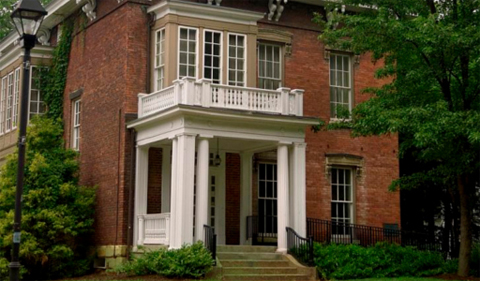
The Trisolini House at Ohio University is home to the Ping Institute.
by Kristin Distel
This year, the Charles J. Ping Institute for the Teaching of the Humanities celebrated an important milestone—its 20th anniversary of providing cutting-edge continuing education for secondary teachers and humanities faculty.
The Ping Institute, which was founded by the Ohio University Board of Trustees, is widely recognized for the excellent support it provides to OHIO faculty and area teachers by way of distinguished teaching fellowships, summer workshops, library acquisitions, course development, and the Bruning Teaching Academy.
Keeping the Humanities Alive
“The Ping Institute seeks to keep the humanities alive and central to the continuing conversation about the meaning and value of a liberal education,” explains Dr. Samuel Crowl, who is a founding member and current institute fellow, in addition to his role as Trustee Professor of English.
The mission of the Ping Institute is to “support activities designed to further the teaching of the humanities. The Ping Institute was created by the Ohio University Board of Trustees in 1992 and is funded by an endowment established by friends of the University, University trustees, and Ohio University Foundation trustees who together more than matched a three-to-one challenge grant awarded by the National Endowment of the Humanities.”
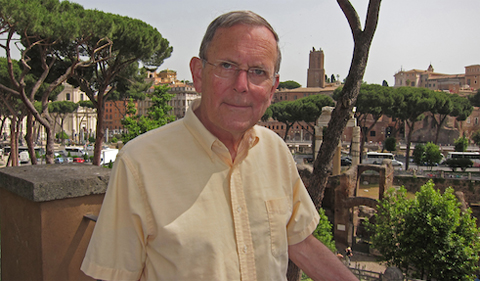
Dr. Thomas Carpenter
Dr. Tom Carpenter, the current director of the institute and the Charles J. Ping Professor of Humanities and Distinguished Professor of Classics, explains that fellowships are three-year appointments, which awardees may renew once.
Bruning Teaching Academy
One of the most successful branches of the Ping Institute is the Bruning Teaching Academy, which is now in its fifth year of operation.
“The BTA is a yearlong program that pairs seven pre-tenure faculty with seven award-winning faculty from across the university for the purpose of improving undergraduate teaching and learning,” explains Dr. Linda Rice, Professor & Chair of English. Rice is the institute’s current James S. Reid Professor, as well as an OHIO Professor of English and Director of the Master of Arts in English Online for High School Teachers.
She notes that the program is not designed to create mentor/mentee relationships among faculty; rather, the emphasis is on faculty positioning themselves to learn from one another irrespective of professional status.
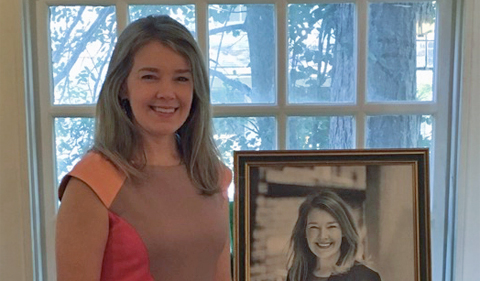
Dr. Linda Rice, James S. Reid Professor and Professor of English
“The program is based on the belief that we can all grow and improve in our teaching ability and that conversations across disciplines and with people who have different experiences is beneficial,” Rice explains.
In an attempt to foster richer and more diverse relationships among faculty, BTA coordinators pair together fellows who are housed in separate departments and often in different colleges.
Summer Workshops: ‘Bright People, Interesting Idea’
The Institute hosts a variety of workshops for high school teachers that, Carpenter notes, have been “very successful.” Several of the workshops focus on group discussions of assigned books. Whenever possible, the author of the book will attend the workshop, answer questions, and participate in discussion with the attendees.
“Teachers always come prepared—not only having read the materials, but also doing some written work or other small project in advance of the workshop,” Rice notes. “It [is] evident that the teachers are doing some really rich and innovative teaching.”
A recent summer workshop focused on Harriet Beecher Stowe’s landmark novel, Uncle Tom’s Cabin. Workshop participants traveled all over Ohio to see the state’s Underground Railroad sites.
Another recent summer institute workshop, A Global Perspective on Islam, was also a rousing success. The session was co-facilitated by Professor Rice, as well as professors Dr. Assan Sarr and Dr. Loren Lybarger.
“We asked the teachers to prepare a short presentation on some aspect of Islam in the Middle East or Africa, and what they came in with was amazing,” Rice notes.
This workshop was an extension of Rice’s own scholarly interests.
“I have had various pedagogical and curriculum development-based projects in the Middle East and parts of Africa, including majority Muslim nations Saudi Arabia, Jordan, Lebanon, and Nigeria for nearly a decade,” she explains. “Being able to share some of my own experiences, lead book discussions, and present alongside Professors Lybarger and Sarr was great, and I learned a lot from them.”
Founding fellow Crowl also leads workshops in his area of specialization—namely, Shakespearean texts and performance.
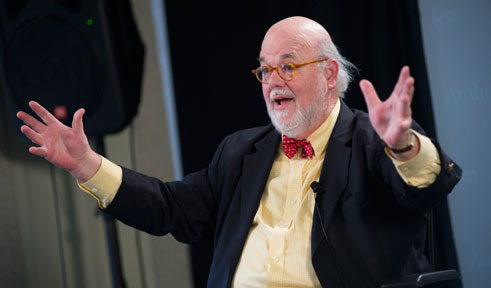
Dr. Samuel Crowl, Trustee Professor of English Literature and Ping Fellow
These workshops often serve as a way for teachers to spark new ideas and to allow them a space in which they are free to “explore the life of the mind,” Carpenter explains.
“The point is to inspire teachers,” he remarks. “When they’re in the classroom with heavy loads, they need occasional inspiration. What they are looking for is to talk with other bright people about interesting ideas.”
Careers Strengthened by Ping Institute Involvement
Ping fellows concur that their involvement with the Institute has provided innumerable professional benefits.
“It has been an intellectual pleasure to develop a variety of programs with colleagues also driven by the core set of values associated with the Institute—to strengthen the teaching of the humanities,” Crowl remarks. “My hope is that we all steal good ideas from one another that come to inform our teaching; I know I do.”
Rice, a former high school English teacher, has been involved with the Institute since 2013. She notes that teacher outreach has been a highlight of her work as a fellow.
“Every one of my 20+ publications, including two books, concerns teaching in some way,” she adds. “My work with the Ping Institute…has kept me reading and thinking broadly. Distinguished Professors Bill Condee, Tom Carpenter, Lois Vines, and Sam Crowl have also been great role models of that kind of critical engagement.”
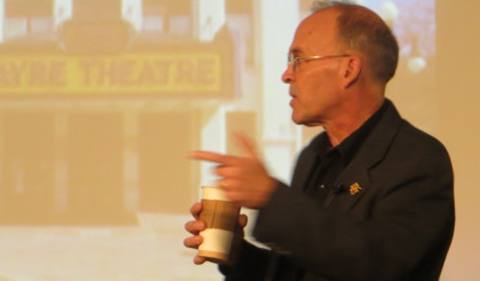
Current fellow Dr. William Condee, J. Richard Hamilton/Baker & Hostetler Professor of Humanities and Professor of Interdisciplinary Arts
Founder Charles J. Ping “An Amazing Man”
These remarkable workshops, seminars, fellowships, and professorships would not be possible without the leadership and support of the Institute’s founder, President Emeritus Charles J. Ping.
“He is an amazing man,” Rice states. “He is a model university leader given his vision, his investments, and his clear value of teachers, teaching, research, and the vital role of the humanities in higher education and life.”
Crowl concurs, noting that President Emeritus Ping’s creation of the Institute has created untold professional opportunities for all involved.
“Working with President Emeritus Ping and a host of humanities faculty, including Alan Booth, Tom Carpenter, Lois Vines, Bill Condee, and Linda Rice, among others, has been an unexpected delight at the end of a long career,” says Crowl.
Seeking New Ideas
As the outgoing director of the Institute, Carpenter wants the campus community to know that the Institute is “always looking for new ideas and ways to improve.”
“We are always thrilled when people share their ideas on how to develop the Institute,” he adds. “We love input, and we enjoy talking to people about our work.”



















Comments